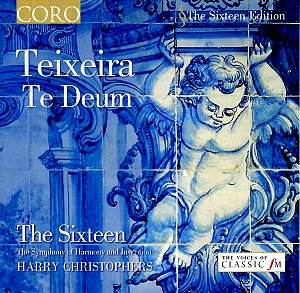|
The name of Antó
nio Teixeira doesn't rate a mention in most books on music history and
underlines the still subjective view of western European music as being
firmly centred, both figuratively and literally, on the Italian and Germanic
lands. It is only in the last decade or so that serious interest has been
shown in early music from Spain. As for Portugal, where Teixeira was born
and spent his career, it is perceived as such an outlier that the ignoring
of major compositional talents such as Teixeira has been allowed to continue
almost without opposition. This recording of his Te Deum of 1734 has been
reissued on The Sixteen's own label Coro, having been previously available
on Collins Classics.
This Te Deum is the sort of work which alone should inspire
further research. It has never been unknown, and certainly not lost, but
has simply been ignored. The autograph manuscript, no less, has lived
for years on a shelf in the Italian Church in Lisbon, but nobody had managed
to prepare a modern performing edition of it. The scoring calls for eight
soloists, five choirs of four voices each and an orchestra containing
strings, flutes, oboes, bassoon, horns and two organs. The scale is tremendous
and the luxuriant textures that result are wonderful. That Teixeira was
so much more than his posthumous reputation allows is clear from the skill
in the marshalling of these huge forces. This music is full of subtlety
as well as the verve and drama that massive forces allow. Unlike those
better-known examples of the 'colossal Baroque' found in Venice or Salzburg
in the early-mid 17th century, this early 18th century music contrasts
the huge scale forces with many intimate arias and small ensemble combinations
that are decidedly rococo in feel. Thus Teixeira is able to sustain variety
and interest over nearly 80 minutes of music. There was a long Portuguese
tradition of lengthy settings of the Te Deum to celebrate the new year
and one wonders how many others are waiting to be performed. It is this
sort of discovery that makes the early music scene still occasionally
exciting.
While the music is a major discovery there are small
aspects of the performance that are not quite as one might like. Teixeira
sets the work in a slightly old-fashioned 'alternatum' idiom, meaning
that every second verse is set to elaborate music while the remaining
verses are sung in the traditional plainsong. This contrast is wonderful
and allows the movements to be worked out on a musical scale that would
not be possible were the entire text set. The plainsong sections are sung
to Portuguese chants from a contemporary source. Clearly the research
has been thorough, but it worries this writer that the chants still end
up sounding as if they were English. They are being sung by Englishmen
of course, but the 'way' in which they are sung is English too, and this
is too clean and 'polite' for the setting. The same slightly restrained
feel is apparent elsewhere and this writer questions the wisdom of such
restraint in this very Iberian celebratory music. The performers themselves
are uniformly excellent, especially the vocal soloists. The problem lies
more in the overall sense of the architecture of Harry Christophers’ conception
of the work. Certainly, he moves the music on and draws from his players
and singers blended, well-tuned performances, but there is some feeling
that he is leaving them to do their thing without getting in their way.
One wonders how much more exciting the performance would be under, say,
Jordi Savall or Nikolaus Harnoncourt. A little more earth and sun, even
a bit of dirt, would seem to be wanted. The horns occasionally produce
this, as apparent in Sample 1, but too frequently it sounds like they,
and the continuo basses, are being restrained from playing with the abandon
that makes the difference between a very good performance and a mind-expanding
one. Hopefully it will not be long before it is possible to compare recordings
of this fine music. In the meantime, there is much to enjoy on this disc.
Peter Wells
|
SPECIAL OFFER
Jan only
CD Price: £ 9.99 Post-free Air Mail World-wide
- Download Price:
£ 11.15
Buy
CD:
Download all tracks:
FREE SOUND SAMPLES
(minimum 30 secs)
Te
Deum Laudamus
Tibi
omnes Angeli
Sanctus
Te
gloriosus
Te
Martyrum candidatus
Patrem
immensae maiestatis
Sanctum
quoque
Tu
Patris sempiternus
Tu
devicto mortis
Iudex
crederis
Te
ergo quaesumus
Salvum
fac
Per
singulos dies
Dignare
Domine
Fiat
misericordia tua
In
te Domine speravi
You require QuickTime to listed to samples.
Get a free
QuickTime download here
|

